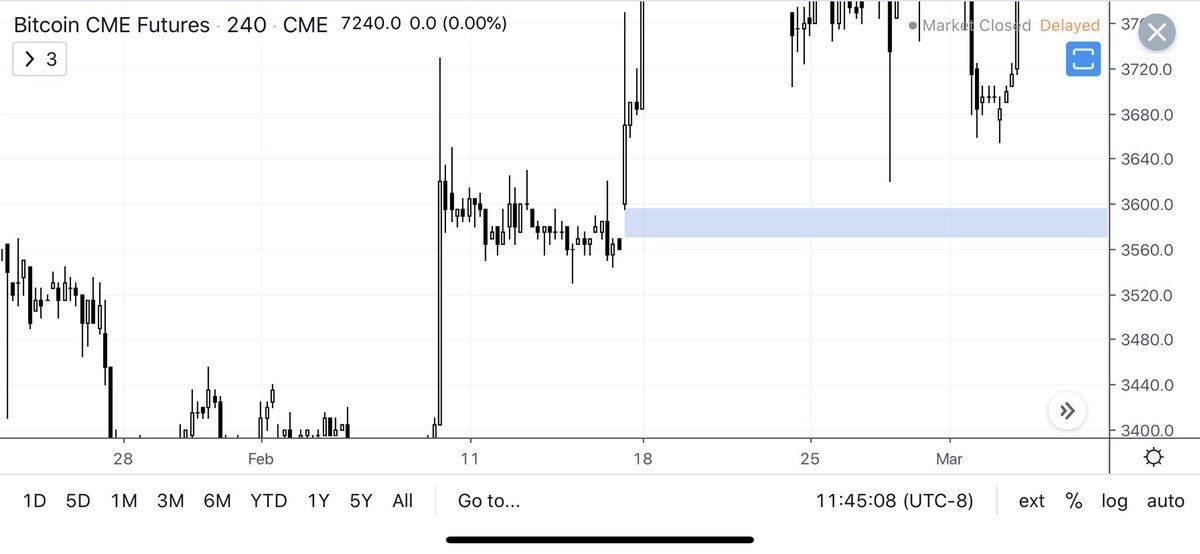If you’ve been on Crypto Twitter at all during 2019, you’ve likely heard the term “Bitcoin futures gap” mentioned again and again.
For some context, a “gap” in a financial market is when an asset doesn’t trade at a certain price, leaving a gap in the order books and charts which is highly irregular. While gaps are rather rare, they’re common in the Bitcoin market because the Chicago Mercantile Exchange (CME) closes on the weekends though cryptocurrencies exist in a 24/7 market, creating discrepancies due to this market’s inherent volatility.
Some say that gaps can be used as a form of analysis, for in traditional markets, assets always fill the price gaps they leave in the coming trading sessions. With there existing remaining gaps on the Bitcoin chart, we must ask: will BTC fill them?
Related Reading: Analysts Fear the Worst as Bitcoin Price Readies to See 20% Breakout
CME Futures Gap Exists 70% Above Current Price
According to cryptocurrency trader “exitscammed,” there exists a Bitcoin CME Futures price gap in between $11,700 and $12,000, left behind from the strong rally seen earlier this year. $12,000 is 70% above the current price level of the low-$7,000s.
$BTC when CME gap fill? pic.twitter.com/qLiMS5ycAA
— exitscammed (@exitscammed) December 15, 2019
This is important as Bitcoin has had a history of filling the gap, moving down or up to prices where the CME’s market didn’t trade at. Just look to this chart from Richard Heart, which shows that nearly every single daily CME gap has been filled by BTC in the weeks that followed a gap’s creation.
Here's a History with all the gaps circled in CME #Bitcoin futures since they started the day of $20k #BTC All Time High.
They've all filled except 1 below us at $8500, and one we just made above us 7 days ago at $11,195. pic.twitter.com/J7mVffmaLX— Richard Heart (@RichardHeartWin) July 19, 2019
There’s also data that indicates that 95% of all gaps in the CME’s Bitcoin market eventually fill, though this is really up for debate, as there is a time element that goes unspoken for; gaps can fill a year later, leaving some to question its relevance.
The exact explanation as to why gap fills occur, or why this correlation exists, varies. Many argue the consistent price action BTC takes to fill gaps is a pure coincidence, while others think it is futures markets playing a large role in the way that BTC trades.
Whatever the case, if historical price action continues to be of any current relevance, it seems that there’s a high likelihood that Bitcoin has the potential to reach $11,800, or maybe even higher, in the future.
Can Bulls Push Bitcoin Back Above $10,000?
But can bulls really do that? Are there other technical and fundamental factors that suggest Bitcoin will reenter the five-digit price range?
According to many analysts, decidedly so.
In its latest annual report, top industry venture capital firm Blockchain Capital revealed that it expects for Bitcoin to “blow past” its $20,000 all-time high sometime next year. This has been corroborated by Mike Novogratz, a former Goldman Sachs partner that earlier this year said that he expects BTC to hit $20,000 by early-2021 at the latest. Former Wall Streeter Travis Kling echoed this, telling Yahoo Finance viewers that by early-2021, BTC is likely to have surmounted its previous all-time high and established a new one.
These analysts look to trends in the macroeconomy, institutional involvement in cryptocurrency, supply-demand factors, amongst other rationales to back these suggestions.
Related Reading: Bitcoin Week in Review: Bears Attack Key Support, But Irresponsible Monetary Policy May Bolster Macro Outlook
Gap Remains at $3,500
While there is a bullish gap 70% above the current BTC price of $7,000, the above analyst who pointed out the existence of the $11,800 gap noted that there exists one in the $3,000s. Yes, the $3,000s, where Bitcoin was trading one year ago.

Should the trend of a large majority of gaps filling with time continue, there’s a likelihood that the cryptocurrency could revisit that level, even briefly in a strong wick to the downside, which may or may not affect the spot market (massive gaps have filled without the spot market budging in the past).
Related Reading: Despite 50% Crash, Bitcoin Still Up 96% in 2019; Can Bulls Maintain Uptrend?
A move back to these levels would corroborate the theories of countless analysts that believe Bitcoin’s rally from $3,100 to $14,000 for the first half of 2019 was a “complacency” or “echo bubble” rally, implying that the cryptocurrency is soon ready to return to the doldrums of irrelevancy.
Featured Image from Shutterstock























